

Stress can cause both positive and negative effects. The negative effect can lead to depression.
What is the link between stress and ageing?
This article is published in collaboration with The Conversation.
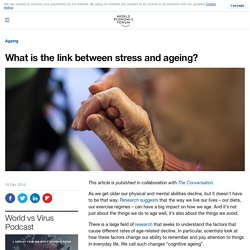
As we get older our physical and mental abilities decline, but it doesn’t have to be that way. Research suggests that the way we live our lives – our diets, our exercise regimes – can have a big impact on how we age. And it’s not just about the things we do to age well, it’s also about the things we avoid. There is a large field of research that seeks to understand the factors that cause different rates of age-related decline. In particular, scientists look at how these factors change our ability to remember and pay attention to things in everyday life.
Earlier work has looked at how diet or doing physical or mental exercise (sudoku, crosswords) affects ageing. A lifetime of stress Work from our lab and from others has found that many of the negative aspects of cognitive ageing seen in older people appear to be linked to the amount of stress they have experienced in their life. Do something about it. Stress And Aging: The Latest Research. Every adult, and increasing numbers of children and adolescents, are familiar with stress.
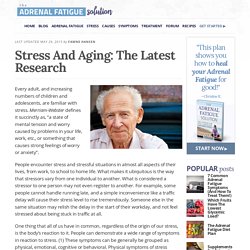
Merriam-Webster defines it succinctly as, “a state of mental tension and worry caused by problems in your life, work, etc., or something that causes strong feelings of worry or anxiety”. People encounter stress and stressful situations in almost all aspects of their lives, from work, to school to home life. What makes it ubiquitous is the way that stressors vary from one individual to another. What is considered a stressor to one person may not even register to another.
For example, some people cannot handle running late, and a simple inconvenience like a traffic delay will cause their stress level to rise tremendously. One thing that all of us have in common, regardless of the origin of our stress, is the body’s reaction to it. Aging and Stress. By Chris Woolston, M.S.

At any age, stress is a part of life. Young and old alike have to face difficult situations and overcome obstacles. While young adults struggle to establish a career, achieve financial security, or juggle work and family demands, older people may face failing health or dwindling finances -- or simply the challenges of retaining their independence. Unfortunately, the body's natural defenses against stress gradually break down with age.
But you don't have to give in to stress just because you're no longer young. Many seniors still manage to sail through their later years. The stress alarm Stress comes in two basic flavors, physical and emotional -- and both can be especially taxing for older people. Emotional stress is more subtle, but if it's chronic, the eventual consequences can be as harmful. Stress hormones provide energy and focus in the short term, but too much stress over too many years can throw a person's system off-balance. Speeding up the clock References. STRESS AND HEALTH: Psychological, Behavioral, and Biological Determinants. Anxiety in the elderly - WebMD. May 22, 2006 -- Anxiety may affect twice as many older adults as depression, according to new research.
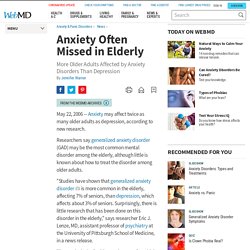
Researchers say generalized anxiety disorder (GAD) may be the most common mental disorder among the elderly, although little is known about how to treat the disorder among older adults. "Studies have shown that generalized anxiety disorder is more common in the elderly, affecting 7% of seniors, than depression, which affects about 3% of seniors. Surprisingly, there is little research that has been done on this disorder in the elderly," says researcher Eric J.
Anxiety and depression signs and symptoms in older people - Beyond Blue. The Stress-Depression Connection. Stress is good for you.
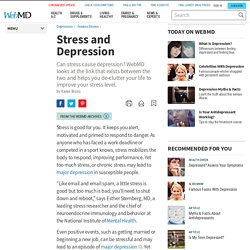
It keeps you alert, motivated and primed to respond to danger. As anyone who has faced a work deadline or competed in a sport knows, stress mobilizes the body to respond, improving performance. Yet too much stress, or chronic stress may lead to major depression in susceptible people. "Like email and email spam, a little stress is good but too much is bad; you'll need to shut down and reboot," says Esther Sternberg, MD, a leading stress researcher and the chief of neuroendocrine immunology and behavior at the National Institute of Mental Health. Even positive events, such as getting married or beginning a new job, can be stressful and may lead to an episode of major depression. The Stress-Depression Connection Stress -- whether chronic, such as taking care of a parent with Alzheimer's, or acute, such as losing a job or the death of a loved one -- can lead to major depression in susceptible people.
Loss of any type is a major risk factor for depression. Continued. Depression and Older Adults. Depression is more than just feeling sad or blue.
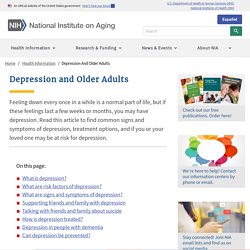
It is a common but serious mood disorder that needs treatment. It causes severe symptoms that affect how you feel, think, and handle daily activities, such as sleeping, eating, and working. When you have depression, you have trouble with daily life for weeks at a time. Doctors call this condition “depressive disorder” or “clinical depression.” Older Adults and Depression. Depression and the Elderly: Symptoms, Statistics, Treatment & More. There are times in life when you’ll feel sad.
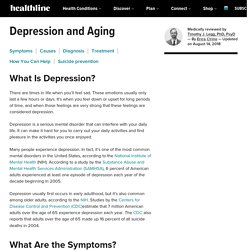
These emotions usually only last a few hours or days. It’s when you feel down or upset for long periods of time, and when those feelings are very strong that these feelings are considered depression. Depression is a serious mental disorder that can interfere with your daily life. It can make it hard for you to carry out your daily activities and find pleasure in the activities you once enjoyed.